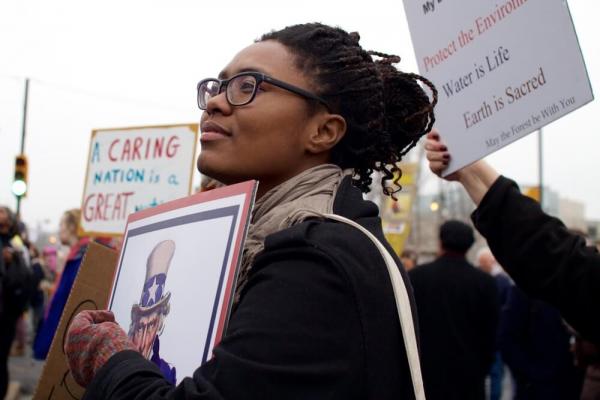Just like poverty stunted the lives of the people of Jesus’ day, poverty hampers, circumscribes the lives of millions of God’s children in our day. 1 in 2 people living in the United States are poor or low-income; 43 percent of US children live in families that struggle to feed, clothe, and house them. There are 28 million people without health care, 65 million workers who get paid too little to sustain themselves and their families, and a record 14 million (1 in 9) U.S. homes are vacant. 3.5 million people experience homelessness each year and 39 percent of them are children.
The poor in the U.S. are of all races, all genders, all ages, and come from all over — urban and rural, citizen and immigrant. They are people who work two or three jobs but still find themselves homeless and poor. They are families who have lost their ancestral burial grounds and right to a livelihood because of mountaintop removal mining and extreme extraction. They are the 22 to 32 million people whose health care is threatened to be cut by politicians who have quality health care.
This shocking abandonment in the midst of abundance brings to mind a Bible passage from Matthew 14. In Matthew 14:13-21, Jesus has just learned that a mentor and friend, John the Baptist, has been executed by the Herodian family. He has pulled back to be by himself to reflect on this news, but the people of the villages follow him on foot. Having compassion, Jesus gets off the sanctuary of his boat and begins to cure the sick. He does this without asking for an insurance card and with the full knowledge that such people have pre-existing conditions (or they wouldn’t need his healing).
As it becomes evening, the disciples suggest that they should dismiss the crowd so they can go get something to eat and find a place to sleep on their own. But Jesus says to the disciples to let the people stay and “you give them something to eat.” What happens next is a story of making a way out of no way. The disciples only have 5 loaves and 2 fishes. Yet Jesus has his followers organize themselves in base communities and Jesus blesses the food. The people enjoy a plentiful meal and are filled. And still, when the disciples gather up the leftovers, there are 12 baskets full.
The words used to explain Jesus multiplying the loaves resonate strongly with the communion formula as he blesses and breaks the bread and hands it to the disciples to distribute. This story of abundance and community when poor people eat together, asking blessing from God, claiming that the abundance on this earth is for all and not just a select few, has everything to do with the true meaning of communion.
And this Bible story resonates with the Poor People’s Campaign that Rev. Dr. Martin Luther King launched at the end of his life. In December 1967, he said:
The dispossessed of this nation — the poor, both white and Negro — live in a cruelly unjust society. They must organize … against the structures through which the society is refusing to take means which have been called for, and which are at hand, to lift the load of poverty … There are millions of poor people in this country who have very little, or even nothing, to lose. If they can be helped to take action together, they will do so with a freedom and a power that will be a new and unsettling force in our complacent national life.
Fifty years later, inspired by Rev. Dr. King’s vision and the stories of our sacred traditions, grassroots organizations along with poor and impacted people are building the Poor People’s Campaign: A National Call to Moral Revival. At this time of intensifying political, economic, and moral crisis, with the lives of the most vulnerable and the spirits of all under vicious attack, people in growing numbers around the country are fighting back for their lives, communities, and deepest values.
Via ON Scripture.
Got something to say about what you're reading? We value your feedback!






